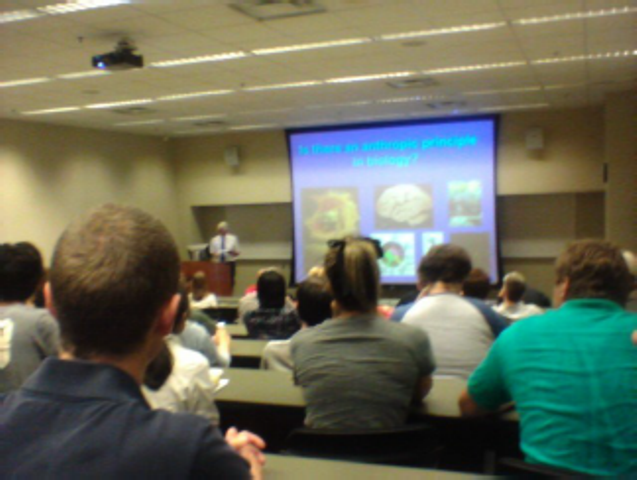Speaker List Announced for Fall 2012 Physics Colloquium at Baylor University

Photo courtesy of the Department of Physics
Follow us on Twitter:
@BaylorUMediaCom
Media contact: Frank Raczkiewicz , (254) 710-1964
WACO, Texas (Sept. 12, 2012) - The department of physics in the College of Arts and Sciences at Baylor University has announced guest speakers for the Fall 2012 Physics Colloquium. Lectures will be given at 4 p.m. on Wednesdays in the Baylor Sciences Building, Room E.125.
"We have a very good list of speakers who are experts in their fields," said Anzhong Wang, Ph.D., a professor of physics and an organizer of the series. "By attending these colloquia, students can be well informed with the cutting-edge physics frontiers and get deep insights into the field. I strongly encourage students as well as faculty to attend."
The schedule of guest lecturers is as follows:
' Sept. 12, 2012: Andy White, Ph.D.
White is a professor at the University of Texas at Arlington and will speak on the International Linear Collider Project: physics, accelerator, and detectors.
' Sept. 19, 2012: Yang Li, Ph.D.
Joining the faculty in 2011, Li is a professor in the department of electrical and computer engineering in the College of Arts and Sciences at Baylor University. He will present a lecture on Electromagnetic Wave Propagation and Antenna Radiation in Forested Environments.
' Sept. 26, 2012: Ryszard Stroynowski, Ph.D.
Stroynowski, professor and chair of the physics department at Southern Methodist University, specializes in optoelectronics and has been involved with the CERN project, the Large Hadron Collider, and the ATLAS experiment in Geneva, Switzerland.
' Oct. 3, 2012: Chris Thron, Ph.D.
Thron is a professor at Texas A&M University-Central Texas and a consultant for Applied Mathematics, Inc. in the field of naval operations research.
' Oct. 10, 2012: Zhenrong Zhang, Ph.D.
In addition to serving as a professor in the physics department in the College of Arts and Sciences at Baylor University, Zhang is interested in researching energy and environment related catalytic chemical physics, specifically, the synthesis of "inverse" model oxide nanocatalysts.
' Oct. 17, 2012: Jennifer Marshall, Ph.D.
Marshall is a research scientist in the Munnerlyn Astronomical Instrumentation Laboratory at Texas A&M University where she manages the lab's efforts to build instruments for HETDEX, GMT, the Dark Energy Survey and other telescopes.
' Oct. 24, 2012: Yue Deng, Ph.D.
Serving as a physics professor at the University of Texas at Arlington, Deng's research interests include upper atmosphere, magnetosphere and ionosphere coupling, and space weather prediction.
' Oct. 31, 2012: Bennie Ward, Ph.D.
Ward joined the faculty of the College of Arts and Sciences at Baylor University as a distinguished professor of physics in 2003. He has collaborated with colleagues in Germany, Poland, Russia and India while pursuing his research in theoretical particle physics.
' Nov. 7, 2012: Linda Olafsen, Ph.D.
Interested in researching the development and application of semi-conductor laser devices in the three to five micron window of the electromagnetic spectrum, Linda Olafsen is a professor of physics in the College of Arts and Sciences at Baylor University.
' Nov. 14, 2012: Jeff Olafsen, Ph.D.
Jeff Olafsen researches the fields of nonlinear dynamics and non-equilibrium systems through interdisciplinary and multi-disciplinary collaboration in the College of Arts and Sciences at Baylor University, where he also serves as a professor.
by Brent Salter, student newswriter, (254) 710-6805
ABOUT BAYLOR COLLEGE OF ARTS AND SCIENCES
The College of Arts & Sciences is Baylor University's oldest and largest academic division, consisting of 26 academic departments and 13 academic centers and institutes. The more than 5,000 courses taught in the College span topics from art and theatre to religion, philosophy, sociology and the natural sciences. Faculty conduct research around the world, and research on the undergraduate and graduate level is prevalent throughout all disciplines.
ABOUT THE SCHOOL OF ENGINEERING AND COMPUTER SCIENCE
The School of Engineering and Computer Science is home to computer, electrical, and mechanical engineering and computer science and provides a solid foundation to graduating computer scientists and engineers. Baylor engineering students achieve a higher passing rate on the Fundamentals of Engineering exam than students from any other engineering program in Texas. Baylor Computer Science students compete at the highest level in the ACM International Collegiate Programming Contest and Baylor is a past National Champion. Each of Baylor's engineering and computer science programs are accredited by the Accreditation Board for Engineering and Technology.
ABOUT BAYLOR UNIVERSITY
Baylor University is a private Christian university and a nationally ranked research institution, characterized as having "high research activity" by the Carnegie Foundation for the Advancement of Teaching. The university provides a vibrant campus community for approximately 15,000 students by blending interdisciplinary research with an international reputation for educational excellence and a faculty commitment to teaching and scholarship. Chartered in 1845 by the Republic of Texas through the efforts of Baptist pioneers, Baylor is the oldest continually operating university in Texas. Located in Waco, Baylor welcomes students from all 50 states and more than 80 countries to study a broad range of degrees among its 11 nationally recognized academic divisions. Baylor sponsors 19 varsity athletic teams and is a founding member of the Big 12 Conference.